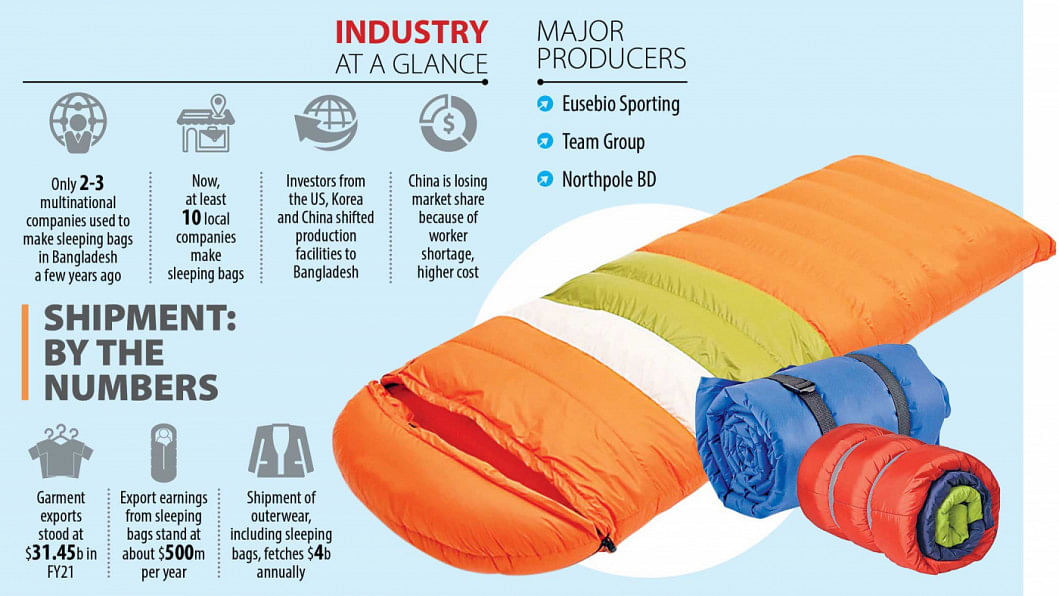Sleeping bags turning into major export item

Bangladesh is becoming a major manufacturer of sleeping bags as China is losing its market share because of worker shortage and higher cost of production.
Even a few years ago, two or three multinational companies, located in the export processing zones under the Bangladesh Export Processing Zones Authority, used to produce sleeping bags. Now at least 10 local companies manufacture such export-oriented items.
The production of sleeping bags in Bangladesh is gaining ground as the country is increasingly turning into a strong player in the production of outerwear such as jackets, tents, skiing wears, sportswear, hunter wears, safety wears, workwear, and rain wears.
Sleeping bags require the same materials and machinery that are used in making outerwear. As a result, a lot of factories are capable of supplying the items.
Outerwear shipment fetches nearly $4 billion annually for the country and a good portion of the earnings comes from the exports of sleeping bags.
China has been the main producer of sleeping bags, but in recent years, work orders have shifted to Bangladesh and other countries because of the shortage of skilled workers and the higher cost of production in the world's second-largest economy.
As a result, despite facing a higher duty on the shipment of sleeping bags to the US, the main export destination for the country, earnings from the item stand at around $500 million annually.
Exporters in Bangladesh used to enjoy the zero-duty benefit on the export of sleeping bags to the US before the scrapping of the generalised system of preferences in June 2013 following the Rana Plaza building collapse.
Since then, local exporters have faced nearly 12 per cent duty on the export of sleeping bags to the US markets.
Still, investors from the US, Korea and China have shifted their production units to Bangladesh to produce the item at competitive prices.
One of the manufacturers is Julio Lin, director of Eusebio Sporting Ltd, a Taiwanese company located in Chattogram. He exports $20 million worth of sleeping bags a year. He also exports tents.
He has been operating the business in Bangladesh for the last 15 years and ships sleeping bags to Europe, Russia, the US, Canada and some South American countries.
Russia is one of the top markets of sleeping bags for Eusebio Sporting, which ships nearly $3 million worth of the item to the country annually.
"I have not faced any challenge in exporting to Russia despite the ongoing war. I am shipping the goods as usual and receiving the payments from my buyers through third countries," said Lin.
Bangladesh has an abundance of skilled workers whereas their number is going down in China.
"The shipment from Bangladesh will grow in a bigger way in the future," Lin said.
People who go outings like trekking and skiing use sleeping bags in the Scandinavian and other European countries as well as North and South American countries.
Abdullah Hil Rakib, managing director of Team Group, a sleeping bag exporter, says the shipment is growing rapidly from Bangladesh.
"The demand will grow further when people start skiing and mountaineering following improvement of the Covid-19 situation."
The demand for sleeping bags has declined a bit over the last two years because of the pandemic and it may take two to three years for the segment to fully recover.
The country leader of a French company that sources sleeping bags from a number of factories in Bangladesh says his company's sourcing growth is 7 per cent to 8 per cent annually.
S M Khaled, managing director of Snowtex Outerwear Ltd, a major exporter of outerwear, says the sleeping bag manufacturing industry is expanding in Bangladesh as the demand is growing globally.
Bangladesh's share in the global sleeping bag manufacturing segment is on the rise as China is losing market share, he said.
Khaled is expecting to
export $300 million worth of garment items. Most of them are outer wear such as skiing wears, jackets, work wears, safety wears, and sportswear.
In 2021, top importers of sleeping bags were the US, the European Union, Germany, Japan, the United Kingdom, Australia, and Spain, data from the World Integrated Trade Solution portal of the World Bank showed.

 For all latest news, follow The Daily Star's Google News channel.
For all latest news, follow The Daily Star's Google News channel. 




Comments